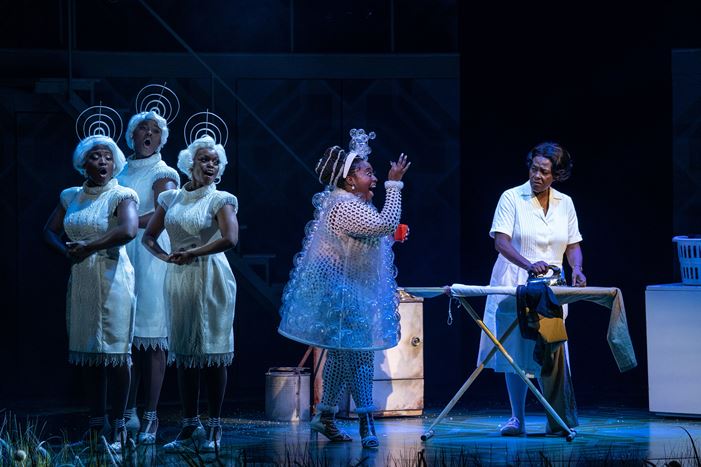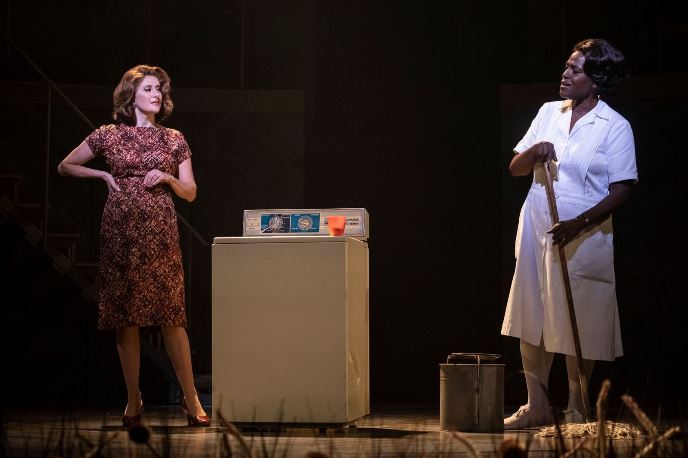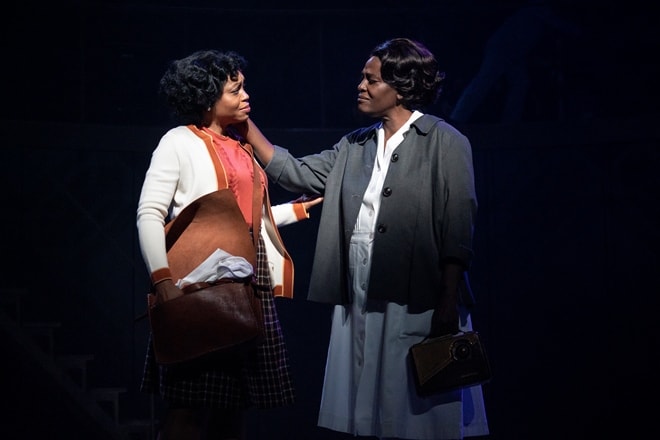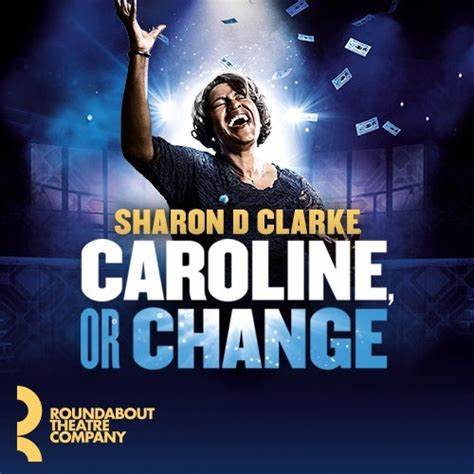It’s Louisiana 1963. The Civil Rights movement is igniting long-overdue progress and protests to end racial discrimination in America, MLK is preaching non-violence, and JFK is promising the help that he hasn’t yet given. Caroline Thibodeaux, a 39-year-old Black divorced mother of four working as a maid for the Jewish Gellman family, is feeling exhausted, angry, resentful, and hopeless. Stuck in a situation from which she doesn’t see a way out, she is devoted to God and the church, and to providing as best as she can for her children on her meager $30 salary. It’s not enough.
Roundabout Theatre Company’s Broadway revival of the profoundly affecting and urgent musical Caroline, or Change by Pulitzer Prize winner Tony Kushner (writer) and Tony Award winner Jeanine Tesori (composer), which made its Broadway debut in 2004, is now playing a very limited, and highly recommended, engagement at Studio 54, with a superb cast led by London’s three-time Olivier Award-winner Sharon D Clarke in the heartrending titular role.

As Caroline spends most of her time in the basement – not just underground in Louisiana, but actually and metaphorically below water – doing the Gellmans’ laundry, ironing, and removing the pocket change left in his clothes by their eight-year-old son Noah, the Washing Machine (Arica Jackson), Dryer (Kevin S. McAllister), and Radio (Nasia Thomas, Harper Miles, and Nya) come to life in her mind and offer some imagined companionship, observations, and songs, as do the Bus (McAllister) and Moon (N’Kenge) she sees on her way home from work. Once there, she is often impatient with her children and wishes that the night would go on forever, so she won’t have to get up and repeat the same unrewarding cycle.
Noah (endearingly played by Adam Makké at the performance I attended) is also experiencing his own pain, grieving the loss of his mother to cancer and finding it difficult to deal with the remarriage of his emotionally distant father Stuart (John Cariani) to Rose – a friend of his late mom, who misses her life in NYC and can’t do anything right with Noah or Caroline. It all comes to a head when Rose (portrayed with an appropriately clueless sense of privilege and condescension by Caissie Levy) tells Caroline to keep the coins she finds in Noah’s pockets to teach him a lesson about responsibility. The boy, who idolizes the often irritated and short-tempered Caroline, loves being with her, and admires how strong she is (much more so than his father), begins to leave money in his pants for her intentionally, and then a big gift from his grandfather accidentally. Will she accept the much-needed change and keep the much larger bill, or will her indignation, self-respect, and Christian ethics stop her?

Framed in the timely device of an offensive public statue of a Confederate soldier (“The South’s Defender”) and directed by Michael Longhurst with a flawless blend of inventive surrealism, sardonic humor, and agonizing reality, Kushner’s compelling multi-layered semi-autobiographical story addresses clashes of race, class, and culture, and the pivotal year of the 1960s, which foreshadows the socio-political turbulence and activism of today. It also recognizes the progress of the next generation, represented by Caroline’s supportive and empathetic friend Dotty Moffett (the excellent Tamika Lawrence), working as a maid while attending college, and her sixteen-year-old daughter Emmie (played with conviction by Samantha Williams), an outspoken and confident follower of Dr. King who challenges the radical socialist beliefs of Rose’s father (Chip Zien) while helping Caroline prepare and serve food at the Gellmans’ Chanukah dinner.

Ultimately, despite her refusal to allow Emmie to speak that way to their white employers, Caroline is shown as a true hero and radiant light, who, through her hard work and sacrifices, has accomplished her goal of making a better life for her children than the one she has and raising them to be as strong as she is, in an uplifting ending that gives hope for the future and leaves few dry eyes in the house.
Tesori’s music (with orchestrations by Rick Bassett, Buryl Red, and music director and conductor Joseph Joubert, and musical supervision by Nigel Lilley) captures the sounds of the era, from Motown Girl Groups to the Blues and Klezmer, with blockbuster harmonies by Nasia Thomas, Harper Miles, and Nya as the Radio, soothing semi-operatic segments by N’Kenge as the Moon, and soul-stirring vocals by the extraordinary Clarke numbering among the highlights, including Caroline’s showstopper “Lot’s Wife.” The period theme is supported by a vintage-style set and costumes by Fly Davis, hair and wigs by Amanda Miller, make-up by Sarah Cimino, and spot-on choreography by Ann Yee, and the mood is enhanced by Paul Arditti’s sound design and telling lighting by Jack Knowles.
Roundabout’s must-see production of Caroline, or Change is imminently relevant and deeply moving. Don’t miss it, and don’t forget to bring tissues.
Running Time: Approximately two hours and 30 minutes, including an intermission.
Caroline, or Change plays through January 9, 2022, at Roundabout Theatre Company, performing at Studio 54, 254 West 54th Street, NYC. For tickets, priced from $49-250, go online. Proof of full COVID-19 vaccination, or a recent negative COVID-19 test for anyone under the age of 12 and those who are unvaccinated due to a disability or religious belief, is required; masks must be worn at all times in the theater.





